The epicenter of winemaker dinners on Seattle’s eastside fine dining scene is Russell’s Restaurant, where Chef Russell Lowell combines his love of the great outdoors with a passion for food & wine
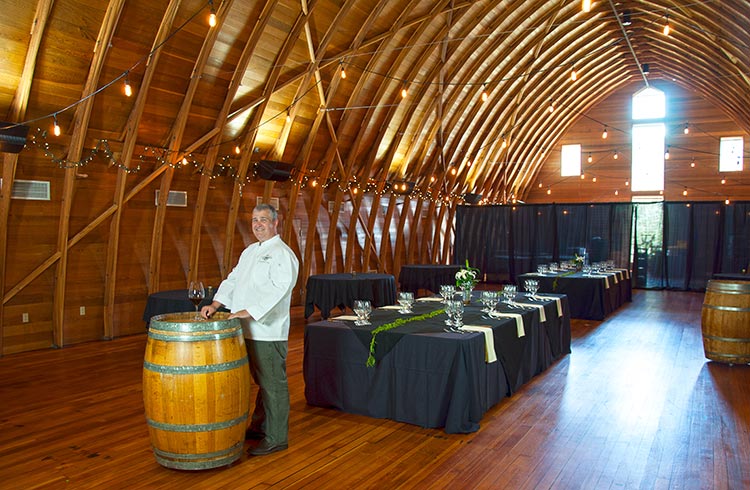
Story & interview by John Vitale
When globetrotting chef Russell Dean Lowell isn’t on a fly-fishing adventure in Baja or guiding a group at elk camp in the Pacific Northwest wilderness, he can be found at his eponymous restaurant and bar in Bothell serving Seattle’s hungry eastside diners. Here, countless winemaker dinners have taken place over the last decade under the chef’s tireless watch, only a short few blocks away from 140-some wineries and tasting rooms clustered throughout nearby Woodinville.
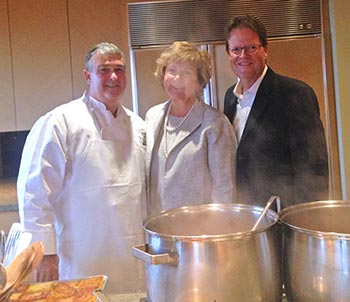
Russell’s moral code to “serve fresh food and take care of your guests” is evident from the fastidious kitchen to the white linen-covered dining tables. With long-established ties to the Washington wine industry, he writes the menus for the restaurant’s multi-course wine-paired dinners that have featured local heavy hitters like Jim Page (Page Cellars), John Patterson (Patterson Cellars) and Kevin Lantz (Lantz Cellars) to name but a few, as well as prominent regional producers like Marty Club (L’Ecole N° 41) and Gilles Nicault (Long Shadows Vintners). There is a mutual camaraderie—respect, friendship and hard work ethic—that’s shared between the chef and inner ring of winemakers.
Simple fare, done well
The restaurant is known for Russell’s style of flavorful American cuisine, with signature dishes like filet mignon with a demi glace and mushroom risotto, grilled salmon with beurre blanc sauce, and seared duck breast with roasted shallot glace. Patrons can be assured that their dinner—steak, pork chop, salmon, halibut, chicken—did not get delivered in pre-cut, shrink-wrapped packaging that is prevalent in the restaurant industry today. Russell takes pride in the fact that the proteins are hand carved onsite; it’s not uncommon for a diner to receive a friendly invite from Russell to join him in the kitchen and watch as the chef personally cuts their meal portion—a rare treat to see a 40 or 50-pound halibut as big as a table cut into fillets!
In 1994, Russell left the corporate restaurant world and started his own catering business. He’s cooked for friends and glitterati that include a long list of Hollywood movie stars, rock stars and other international celebrities, even heads of state like Nelson Mandela and the King of Spain. A gifted storyteller, Russell shares a few of these personal and amusing narratives from his life’s journey in a hardbound, well-illustrated cookbook, In Search of Duende.
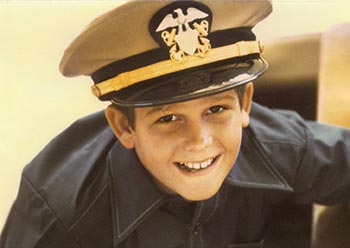
Growing up on an island
Russell’s appreciation for nature and its bounty started at a tender age. When he was eight, his father was stationed as a naval officer at Guantanamo Bay. The boy’s afterschool playgrounds were the wild outskirts of the tropical island—thickly knotted mangroves, endless marshes, banyan-covered forests and mudflats. He fell in love with the saltwater, the tides, and the alluring pull of nature, with eyes wide open to the magic and abundance of tropical fish, crustaceans and myriad of sea life all around him. During those early formative years in Cuba he developed an appreciation of the Spanish culture.
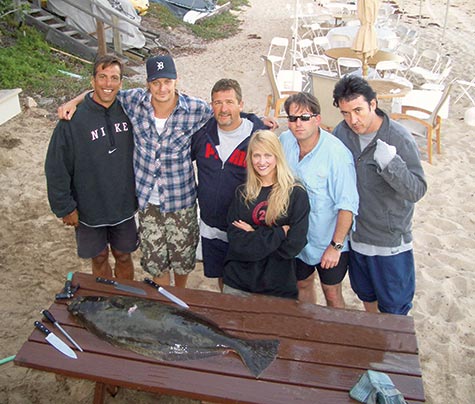
Growing up, Russell spent summers with his grandparents on the West Coast where he learned to fish, hunt and survive in the coastal areas and forests of the Pacific Northwest. A natural-born athlete with an air of quiet ruggedness, Russell is renowned among elite circles of world-class sport fishermen for his expertise at hand-tying fishing flies that consistently land trophy catches.
As a teenager living in San Diego in the ‘70s, Russell quickly became a diehard surfer and skateboarder. During his high school years he took a job working at a local restaurant under the tutelage of a strict French-trained chef, which became the springboard that would launch his career path as a chef, caterer and restaurateur.
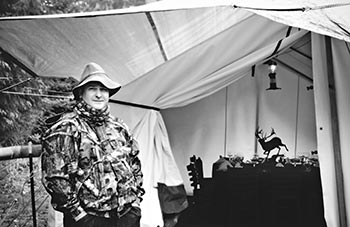
Giving back to community
An avid sportsman, the chef founded Russell’s Elk Camp some 20 years ago as a way of giving back, which has raised thousands of dollars for charities like the Fred Hutchinson Cancer Research Center. Many of the camps are bid on at charity auction events and often bring high donations from city folk seeking a chance to experience a day at an authentic hunting camp in the remote wilds—and a wild game feast personally prepared by Russell. (Editor’s note: Click here to read about elk camp, plus a savory recipe from Russell.)
Interview
I recently sat down with Russell (in the beautiful Loft event room upstairs from the restaurant) for an exclusive interview to learn more about the chef’s personal side.
You’re doing 12 winemaker dinners a year?
Russell: Yes, we’ve already done six this year. We’ll do six in the fall.
Describe the relationship between yourself as chef and the winemakers you’ve worked with over the years?
Russell: First and foremost you always need to be humble and thankful that you have these artists that are bringing their fine products to you. And you need to deliver to them. So if you’re going to pour an expensive bottle of wine, your food better deliver too. You owe it to them and they owe it to you. After all, we’re here to take care of guests.
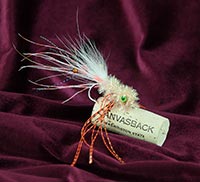
How does your passion for fishing and hunting tie in to your restaurant?
Russell: I’m of the opinion that a chef should know how to harvest everything that he’s going to produce. If you don’t know how to kill it, harvest it, and you don’t know what it takes to get it, how are you going to represent it?
Tell me about the art involved
in cutting all your food proteins
in-house?
Russell: We don’t have anything precut; we cut it all here. So I can say to a patron: Hey, would you like to eat a steak tonight? I tell you what, I want you to come in the back and choose the size of the fillet you’re having tonight. So guests see the process, the tools we have, sharpening our own knives. If this isn’t art, I don’t know what art is. You really need to know the product and how to treat your tools.
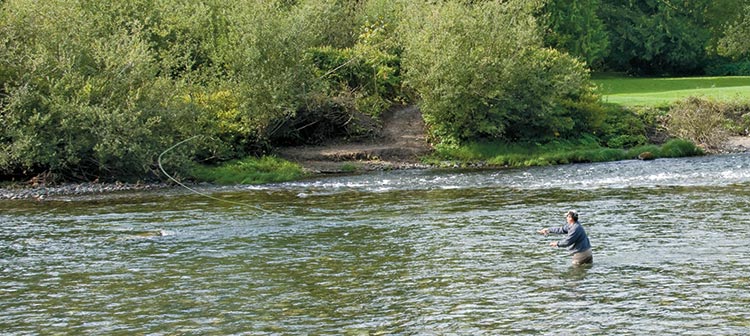
Is that a common practice?
Russell: No, a lot of chefs get it packaged and precut. There’s a lot of hype around it, and I don’t think that a lot of chefs today actually process their own food. Let’s take lamb racks—do you know how to peel the bones? Do you even know where this lamb was grown? Who slaughtered it? Whatever the meat or fish is, we cut it here.
Tell me about your famous housemade demi glaces and sauces.
Russell: They’re bone reduction sauces, whether it’s fish bones or veal bones or chicken bones. We don’t use any flour. This is old school stuff. It infuses all the proteins and the flavor profile is giant. I think that’s why people love this place, because nobody’s doing the demi glaces any more. The other thing we do here is roast duck bones and chicken bones. And we’ll take and mix the duck bones after we skim off all the fat. And we’ll marry that with the chicken stock, so this flavor is like, oh my God, it’s too much. I had a teaspoon and it was like, get it away from me!
Where did you start your training?
Russell: There was a wonderful French chef in San Diego. I got a job with the guy. And I can’t believe what I was able to learn at such an early age. I had a key to the restaurant by the time I was 18. After he taught me so many different things, my biggest goal was to come in every Saturday and pound out everything I could, so that when he came in, he didn’t have anything to do! I thought that was a wonderful way to say thank you for all he showed me.
You’ve been a chef for nearly four decades. Have you always enjoyed the work?
Russell: I was always of the opinion I can’t wait to get to work today. Something cool is going to happen—I don’t know what it is, but something cool is going to happen. This isn’t work—I’m not digging a ditch, that’s work. I’m walking through my kitchen; I’m cutting meat, and fish, talking to my staff. You know, just teaching good things.
Growing up in Cuba you fell in love with the culture.
Russell: I really like Spanish, I just love it. I love the rhythm of it, I love the poetry, I love the literature. In college I took every Spanish course they had to offer at the University of Washington. It was a wonderful opportunity.
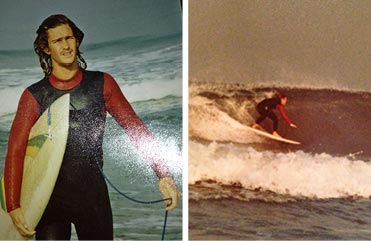
Favorite heroes growing up?
Russell: Surfer Gerry Lopez. Mr. Pipeline, the master of the pipeline. Oh, and Mark Richards, Australia’s number one surfer.
How did your childhood in
Cuba help you with water
sports like surfing?
Russell: I started surfing at age 16 when I came to San Diego. And I was already experienced at reading water, the hydraulics of reefs; it takes a long time for one to develop that. I learned that in Cuba. Water and tides. If you can read water you can say, I’m not getting in over there, it looks like a lot of sharks over there, or hey the tide is coming in, it’s going to cover this place soon. I still have two boards at my house, both thrusters.
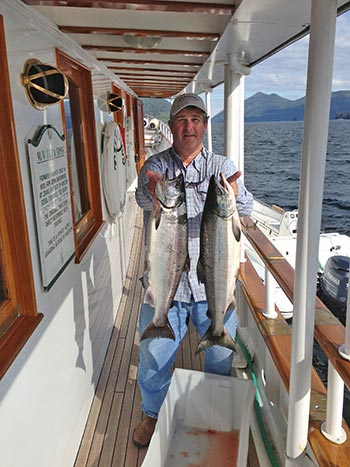
When did you first learn to
fish and tie flies?
Russell: I remember at an early age fishing with my aunt, a great fly tyer, on the Umpqua River. She said, make sure you don’t let out too much line. Of course, I let out a lot of line (grins). Caught a nice rainbow trout. Got him on a fly.
Best friend growing up?
Russell: I spent summers with my grandfather, who actually turned into my best friend. He was a gold miner in Northern California on the Trinity River. They lived off the land. He’s everything I am today plus five or six more things. I remember we’d go underwater with a four-inch dredge hose and a compressor, and breathe from the compressor, and just suck up the bottom all day long. And that was an unbelievable experience. We found a lot of gold, but of course I didn’t care about money, I just gave it to my grandfather. I always wanted to be like him. What a great man.
Do you often get the chance to fly fish these days?
Russell: Show me a puddle, I’ll show you a fish.
Wine & Dine Now!
Russell’s Restaurant & Loft
3305 Monte Villa Parkway, Bothell, WA 98021
Phone: (425) 892-8492
Catering & Events at The Loft
Phone: (425) 892-8492
Email: catering@russelllowell.com
